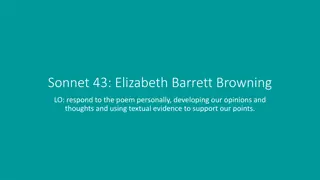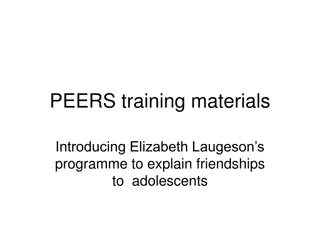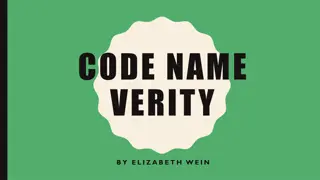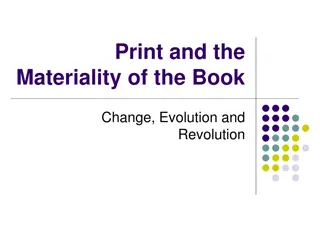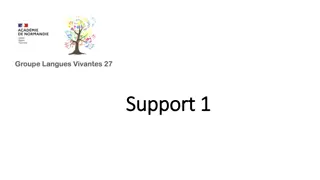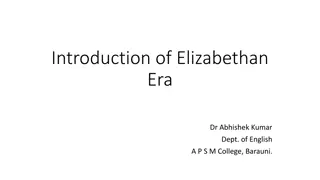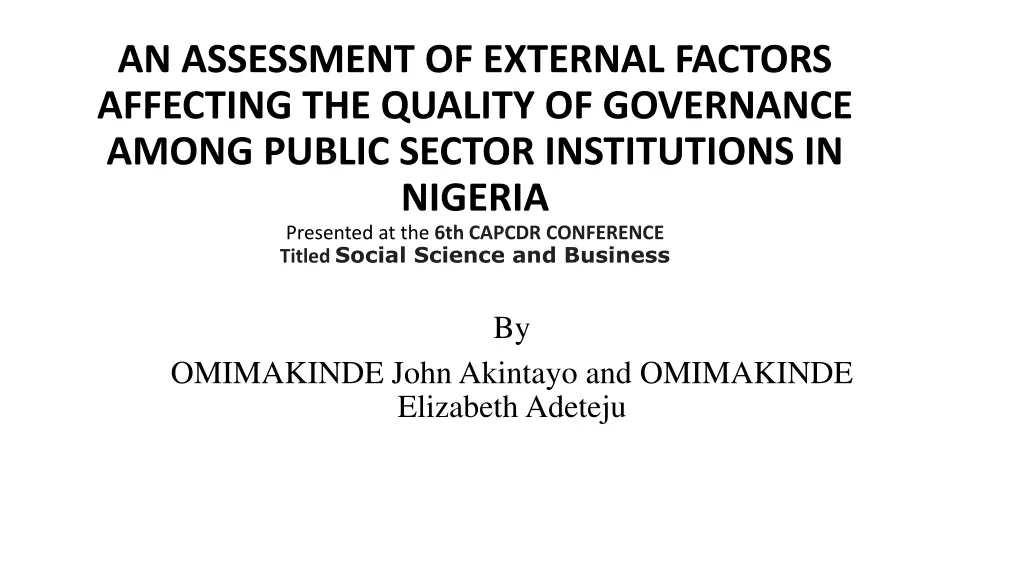
Quality of Governance in Nigeria's Public Sector: External Factors Assessment
Explore how external factors influence governance quality in public sector institutions in Nigeria, focusing on ethics, trade unions, and more. Key questions addressed include the impact on ethical behavior and governance effectiveness.
Download Presentation

Please find below an Image/Link to download the presentation.
The content on the website is provided AS IS for your information and personal use only. It may not be sold, licensed, or shared on other websites without obtaining consent from the author. If you encounter any issues during the download, it is possible that the publisher has removed the file from their server.
You are allowed to download the files provided on this website for personal or commercial use, subject to the condition that they are used lawfully. All files are the property of their respective owners.
The content on the website is provided AS IS for your information and personal use only. It may not be sold, licensed, or shared on other websites without obtaining consent from the author.
E N D
Presentation Transcript
AN ASSESSMENT OF EXTERNAL FACTORS AFFECTING THE QUALITY OF GOVERNANCE AMONG PUBLIC SECTOR INSTITUTIONS IN NIGERIA Presented at the 6th CAPCDR CONFERENCE Titled Social Science and Business By OMIMAKINDE John Akintayo and OMIMAKINDE Elizabeth Adeteju
OUTLINE Introduction Conceptual Framework and Literature Review Research Methodology Result and Discussion Conclusion and Recommendation References
INTRODUCTION Public sector entities are organisations owned by the government Or those institutions in which government has significant influence on its management. They are in most cases finance through government budget as most of them are established by the government to serve some welfare purposes. Some public sector entities are also established to serve as a regulatory body, income generating agency, protective or defense purposes.
INTRODUCTION Contd INTRODUCTION Cont d These institutions carry out activities on behalf of the public to ensure that both the government and the people being governed get maximum benefits either socially or economically from their services. Accountants are key agents in public institutions that manages the financial resources of the organisation and are in most cases saddled with the responsibility of producing financial information for inclusion in the corporate reports.
INTRODUCTION Contd This work intends to find answers to the following fundamental questions being raised by people: i. To what extent has external factors affect the quality of governance among public sector entities in Nigeria? Ii. Do external factors really affect ethical behaviours among practitioners in public sector institutions in the country? Iii. What extent do trade union influence the quality of governance in the sector?
Conceptual Framework and Literature Review Relevance of Ethics in Governance Ethics are moral values or principles of behavior that guide whether an act is right or wrong. It is a standardised or expected form of conduct that is assumed to befit a professional in the field And other actors in the business world and practices in order to enhance their professionalism and maximize idealism, justice and fairness when dealing with the public, clients and other members of the profession (Menbarrow, 2021).
Literature Review Contd Ethics are normally issued by various organisations and professional bodies like Engineers, Surveyors, Accountants and so on. With respect to the accounting professionals, their international umbrella body, the International Federation of Accountants (IFAC) issues these codes and are adapted at the national level in almost all the members countries. These ethics include: competency, due care, independence, confidentiality, integrity, objectivity, fidelity and responsibilities to other members (IESBA,2018).
Literature Review Contd The problems of poor societal value, corruption, incomplete disclosure of information, lack of organisational ethics or clearly defined ethical standard for non-accountants in many organisations are also said to affect observance where there is poor governance in public sector organisations. The word ethics involves more than compliance with policies, laws and regulations. Simply put the ethics has been defined has a science of morals. It involves learning the difference between what is right and wrong and then doing the right thing (Oladele etal.,2012).
Literature Review Contd The question therefore is who decides what is right and what is wrong? This may be a question that is difficult to answer because human behaviours are as varied as the planet cultures and geopolitical society (Sliva,2020). What therefore may be acceptable in one culture might be unacceptable to another. From the above, it can be adduced therefore that ethical behaviour is not only limited to following rules and regulations but includes the putting of moral restraints on our personal desires and acting in a manner that follows the spirit of guidelines.
Literature Review Contd Purposes of Issuing Ethical Standards The purposes or reasons for professional code of ethics are to ensure that: members and practitioners in that profession observe proper standards of practice, refrained from every form of misconduct that can tarnish the image of the organisation or the profession, and to establish a standard by which disciplinary action can be taken against erring members.
Literature Review Contd This will not only encourage practitioners to act in the public interest but will also provide appropriate regulation for member s activities. Ethic helps: Accountability, Honesty, Dependability, Loyalty, Fairness, Caring, Professionalism, Respectfulness And Responsible behaviour in both the work place and professional practice.
Literature Review Contd Effect of External Factors and Influence on Governance and Ethics There are a lot of threats which at times affect the observance of ethics among government agencies. Board and other professionals at time are faced with ethical dilemma when there are strong external factors or influence which appears irresistible during legitimate service delivery which may cause them to compromise objectivity. In ethical dilemma, pressures are applied to professionals to disregard the tenets that underpin good governance and do something else to satisfy a particular interest or group (Wati and Momon,2020).
Literature Review Contd Few of these factors are listed below: Political Influence Religious Influence Traditional institutions Trade Union Gender Influence Ethnicism
Research Methodology Research Design Descriptive research design was employed to gather necessary information on the opinion of senior level officers in government institutions on the extent of external influence in other to answer the specific questions that are addressed in the study. The design method was considered suitable because structured questionnaires were used to obtain primary data that were analyzed in this study.
POPULATION FOR THE STUDY All the 27 Federal Ministries in Nigeria that have major representation in the six states within the South West Geopolitical Zone are the population for the study. The 27 Federal Ministries has a total of 121 agencies or institutions within the selected Zone i.e. South West Geopolitical Zone. From each of this agency or institution, 15 relevant respondents were purposely selected based on the criteria set to be met by the respondents. The criteria are that the respondent must be head of department or persons reporting directly to the head of department and must be working in any of the following departments: Finance and Account, Internal-Audit, Procurement, Planning Budget and statics, Human Resources or Administration and the office of the Chief Executive Officer(CEO).
POPULATION FOR THE STUDY Contd This amounted to 1815 as total population in term of respondents. However due to resources constraints, multi- stage random sampling was used to select only 9 Ministries out of a population of 27 Ministries and then 3 Agencies each were selected from each of the 9 Ministries earlier selected making a total of 27 Agencies that were used for the study. The number of agency selected from each Ministry was limited to only 3 so that the study can be completed within the stipulated time and also because the total number of Agencies selected will still be above the minimum standard of 20% as stipulated by scholars in a stratified situation like this (Zulueta and Costales,2003). The selected agencies represent 22.2% of the study population which is in line with the sample size already determined.
Table 3.1: Distribution of the selected MDAs and Respondents State Number of MDAs Number of MDAs Selected (%) selected from each state % selected from total no of MDAs in Southwest state of MDAs Lagos 55 11 41 Oyo 16 4 15 Ogun 13 3 11 Ondo 12 3 11 Osun 13 3 11 Ekiti 12 3 11 Total 121 27 100 22.3
RESULT AND DISCUSSION Table 3.2 below shows the responses of respondents on the question to what extent do five external factors listed likely to affect quality of governance in your institution? The table shows the responses of respondents on the question to what extent do the following factors affect governance quality in your institution. The results show 34.21% of the respondents reported political influence to a great extent serves as an external influence that affect governance in their establishment. This is followed by the 35.86% that admitted the effect was to a moderate extent. Then, approx. 17.43% claimed political influence only influence governance to a low extent.
RESULT AND DISCUSSION Contd While 7.89% and 4.61% respectively said the effect was very low and no effect at all. Regarding the effect of ethnic factors such as traditional institutions on governance practice among these MDAs, about one-fifth (19.34%) said to a great extent while two out of five (37.05%) reported the effect to be moderate. This is followed by 22.30% and 9.84% who confirmed community factor only had low and very low effect. Lastly, only 11.48% said there was no effect at all. Hence, majority agreed community factors affect, at least moderately, the quality of governance.
RESULT AND DISCUSSION Contd While mentioning the effect of external influence on quality governance, 11.21% claimed religion and culture has a great effect while 34.51% reported a moderate level of effect of religion and culture on governance. Only one in five (21.24%) and 17.70% reported it only had low and very low effect respectively on quality governance while 15.34% never believed it had any effect. One in five (20.99%) said Constitutional factors to a great extent had an effect on quality governance while 46.06% said the effect was only moderate. This is followed by 13.99% and 10.79% that said respectively said the effect was low and very low. Close to one in ten (8.16%) said their perceived effect of this relationship was zero.
RESULT AND DISCUSSION Contd Lastly, Gender policy is seen to a great extent and moderate extent by 9.47% and 3.53% of the respondents respectively as having effect on quality governance. This was followed by 19.53% and 16.86% who said the effect was low and very low respectively. Lastly, only 14% never perceived any effect of gender policy on quality governance. Decision: The grand mean of 2.16 shows external factors moderately influence quality of governance among public Sector Entities.
Table 3.2: External factors and Public Sector Governance SNN External influence and To a great Moderate extent Low extent Very low No effect Mean Decision Public Sector extent extent score Governance 1 Political influence 34.21 35.86 17.43 7.89 4.61 1.94 Moderate 2 TraditionalInstitutions 19.34 37.05 22.30 9.84 11.48 2.34 Moderate 3 Religion and culture 11.21 34.51 21.24 17.70 15.34 2.51 Low 4 Ethnitism 20.99 46.06 13.99 10.79 8.16 1.97 Moderate 5 Gender policy 9.47 39.64 19.53 16.86 14.50 2.05 Moderate Grand mean 2.16 Moderate
Influence of external factors on ethical behaviour/observance Table 3.3 Below shows the result of the correlation analysis among the variables which shows that external factors influence on ethics have negligible correlation which is less than 0.8 across the relationships. More so, the correlation among the explanatory variables indicates the existence of highly negligible correlation. The result shows that the explanatory variables do not have more than 0.8 correlations with each other. This implies that the models where these variables are used were free from the problem of multi-collinearity, which may understate or overstate the standard error.
Table 3.3: Pairwise correlations Variables (1) (2) (3) (4) (5) (6) (1) Ethics 1.000 (2) external influence 0.307* 1.000 (3) Academic Qualificat 0.046 0.055 1.000 (4) Professional Qualificat 0.142* 0.039 -0.094 1.000 (5) Level in Organization -0.163* 0.010 0.098 -0.026 1.000 (6) year of establishment 0.096 -0.011 -0.067 -0.039 0.111* 1.000 * shows significance at the 0.05 level
Pairwise correlations Explanation The table examines the effect of external influence on ethical behaviour in selected public entities in Nigeria. To arrive at each of the variables in the explanatory mix, the items representing ethics and external influence were reduced to a single factor for each construct having fulfilled the rule of thumbs posited by Hair et al., (2010) that to conduct exploratory factor reduction, each construct must not be less than three items. For model adequacy, the Kaiser-Meyer-Olkin (KMO) values for model was not more than the 0.6 which shows model adequacy across the model. The multivariate analysis of the relationship between ethical behaviours and external influence shows external influence is a strong predictor of ethics in the model. By implication, a unit increase in external influence brings about a positive (20%) and significant increase in professional ethics practice while other individual specific variables kept constant.
Table 3.4: Linear regression _ethics Coef. St.Err. t-value p-value [95% Conf 0.091 -0.133 -0.126 -0.054 -0.132 0.071 0.624 Interval] external_influence Noofyearsintheorga~n AcademicQualificat~n ProfessionalQualif~s LevelinyourOrganis~e year_of_establishm~t Constant 0.220 -0.046 0.025 0.060 -0.066 0.177 1.309 0.066 0.044 0.077 0.058 0.034 0.053 0.347 3.35 -1.03 0.33 1.04 -1.94 3.31 3.77 0.001 0.305 0.743 0.299 0.054 0.001 0.000 0.349 0.042 0.177 0.174 0.001 0.282 1.993 Mean dependent var R-squared F-test Akaike crit. (AIC) 1.766 SD dependent var 0.140 Number of obs 5.161 Prob > F 367.579 Bayesian crit. (BIC) 0.706 178.000 0.000 389.852 *** p<0.01, ** p<0.05, * p<0.1
Table 3.5: Extent of Trade Unions (e.g. NASU, SSANU, ASURI etc.) Influence on Governance Quality S/N Key Governance quality To a very great extent (%) Great extent Modera Low extent No effect Mean Decision te extent 1 Integrity 26.81 42.36 13.06 5.59 12.18 2.27 Moderate 2 Sound Policy 25.59 42.65 13.24 8.24 10.28 2.35 Moderate 3 Accountability 27.10 43.61 11.57 7.42 10.39 2.30 Moderate 4 Compliance 23.82 47.00 15.00 5.57 8.61 2.33 Moderate with rules/laws 5 Responsiveness 20.06 42.18 19.18 6.77 11.81 2.48 Moderate
CONCLUSION AND RECOMMENDATION The tested results show that external factors has moderate influence on the quality of governance while its influence on ethical behaviour or observance is direct strong effect. Trade union also has great effect on the quality of governance among government entities. It is recommended that government should manage these external factors such that their impact if any should be greatly minimized as they have the tendency to weaken the quality of governance among government controlled institutions.
SELECTED REFRENCES Omimakinde John. A and Adejuwon Joshua. A (2022). Impact of Corporate Governance on Accounting Standards Compliance in Nigeria Public Institutions American https;//doi.org/10.47672/ajacc.1140 Zahra Membarrow (2021). The importance and Necessity of professional Ethics in the organisation : Psychology and Behavioral Science International Journal Volume 18 Issue1 DOI: 10.19080/PBSIJ.2021.18.555979 1. Journal of Accounting, vol.4 1ssue1.Doi: 2. 3. Victoria, Artur. (2018). Business Ethics. 10.13140/RG.2.2.31350.86082. 4 IESBA,(2018) International Code of Ethics for Professional Accountants (Including Standards),pg. 1 200, http://www.ifac.org/system/files/ International Independence 5 Adegbie F.F, and F. E Temitope F.E (2015) Ethics, Corporate Governance and Financial Reporting in the Nigerian Banking Industry: Global Role of International Financial Reporting https://doi.org/10.5430/afr.v5n1p50 Accounting and Finance Research, Standards, 6. Oladele Rotimi, Abdulrafiu. N, Ezeani & Idode, Patrick. (2012). Ethics and Professionalism ness environment; Analysis of users Perspective of Accounting Information: International Journal of Management Sciences and Business Research. Vol.1 Issue 11 pp 34-59 (ISSN: 2226-8235) 7. Paulina Silva (2020) Moral Understanding as Knowing Right from Wrong; The University of Chicago press journal vol.127 issue 3. 8 .G20/OECD Principles of Corporate Governance, (2016), https://doi.org/10.1787/9789264257443-tr. 9. Ricart J.E & Rey C. (2022) Purpose in Corporate Governance: The Path towards a More Sustainable World . Sustainability no.14.https://doi.org/10.3390/su14084384 10. Osho A.E and Ogodor B.N. Effect of Corporate Governance Culture of Banks Financial Performance in Nigeria Research Journal of Finance and Accounting.9 no 8. 20018 pp 45-56

